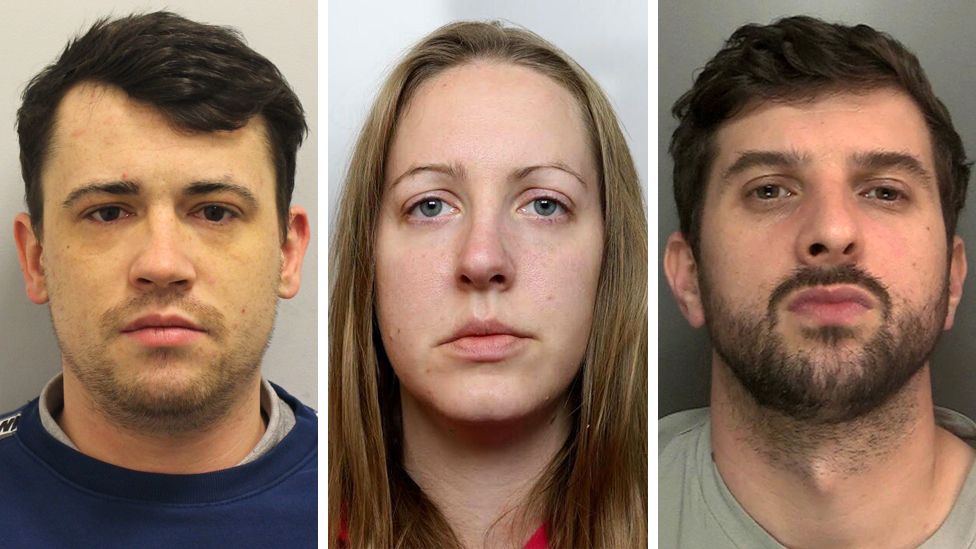ARTICLE AD BOX
 Image source, Met Police / Cheshire Constabulary / Merseyside Po
Image source, Met Police / Cheshire Constabulary / Merseyside Po
Killers Jordan McSweeney, Lucy Letby and Thomas Cashman all refused to appear in court for sentencing
Families of victims of serious offenders say plans to give judges more powers to make criminals attend sentencing hearings will ensure loved ones are "put first".
The mother of shooting victim Olivia Pratt-Korbel and the sister of murder victim Sabina Nessa have been campaigning for the law change.
It comes after baby killer Lucy Letby refused to appear for her sentencing.
Critics say the move is a "knee-jerk, headline-grabbing" response.
Under new rules, judges will be able to order an offender to attend a sentencing hearing and make it "clear in law" that reasonable force can be used.
Those who refuse could face an extra two years in prison - although this will make no difference for someone like Letby who has been given a whole life order and will never be released.
Powers already exist for judges to compel people to attend, but officials said they are rarely used, and a law change would "make it clearer" for judges to enforce it.
Jebina Islam, Ms Nessa's sister, told the BBC she was "delighted" to see victims and their families being "put first".
Ms Nessa was murdered in September 2021 by Koci Selamaj as she walked through a park in south-east London - he refused to appear in court for his life sentence.
"We've worked hard for this and it's about time that we've seen this change happen," she told BBC Radio 5 Live.
She said her family felt angry when Ms Nessa's killer refused to stand in the dock for sentencing.
"How is this fair? How is this allowed? He murdered my sister, our sister," she said.
Cheryl Korbel, whose nine-year-old daughter Olivia was killed by Thomas Cashman - who also refused to appear in court when he received his life sentence - has been among those campaigning for the law change.
She told ITV she hoped Olivia was "proud of what we've done".
"Because at the end of the day, it's in her name, it's why we've done this. And not only in her name, it's for every family out there that has gone through it," she said.
"We just hope it gets changed so no-one else has to go through it."
Letby refused to appear in the courtroom for her sentencing hearing, something the mother of two of her victims said was "just one final act of wickedness from a coward".
'Coward's way out'
Prime Minister Rishi Sunak said it was "unacceptable" that some of the country's "most horrendous criminals" have refused to come to court.
"They cannot and should not be allowed to take the coward's way out," he said.
However, the father of a murdered police officer warned against a "knee-jerk, headline-grabbing response".
Former prison officer Bryn Hughes' daughter PC Nicola Hughes was killed in 2012 alongside a colleague in a gun and grenade ambush while on duty in Greater Manchester.
He said he had witnessed the issue from "both sides of the courtroom".
"On being the father of someone who was murdered and being in court, and a former prison officer who has actually restrained someone into court. It is difficult," he told PA news agency.
He said it was often very difficult to force people up the often narrow steps from the cells into courtrooms, and had seen the behaviour of prisoners forced into courtrooms.
"Foul abuse towards the family, abused the court, turned their back, kicked off, fought, spat, bitten people," he said.
Guidelines already exist for judges to increase sentences for those convicted failing to appear, under the Content of Court Act. But Ministry of Justice officials say they could only find one example in a decade of a judge using their powers to make someone attend.
Shadow home secretary Yvette Cooper said a law change would "make it easier" for judges to ensure those found guilty appear in court. The families of victims of serious offenders said plans to give judges more powers to make criminals attend sentencing hearings will ensure victims are "put first".

 1 year ago
20
1 year ago
20








 English (US) ·
English (US) ·